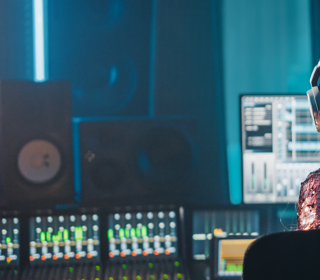
Blog

Did you know that women only make up 5% to 7% of the audio engineers and producers in the industry*? We spoke to students Amara and Ruby, who are currently studying BSc (Hons) Sound Engineering and Production, about their experiences of being in the profession and what they think the future holds for female engineers.
Q: What made you want to pursue a career in Sound Engineering?
Amara: From an early age I took up an interest in learning the guitar and after a few years I was also learning how to play the piano and professionally sing. But after many years of performing, I realised that I didn’t enjoy it. In college, I discovered Music Technology and my love for live sound and acoustics began from there.
Ruby: I like a challenge and the idea of studying something practical, with the combination of art and science is well suited for me. I’ve always been interested in sound and music. I did a maths A level and really enjoyed the problem-solving aspect of it. Initially, I chose to study a film production course but quickly realised that I enjoyed the sound side of things, which wasn’t a primary element of that particular course. After speaking to a module leader from Sound Engineering, I knew that was a better-suited course for me - technical, creative and involving my passion.
Q: What has been your overall experience of your course and how has it prepared you for your future career?
Amara: University has been the greatest experience of my life so far and I’m so grateful for the support, networking and opportunities that I have had. Of course, completing a degree can be stressful but it makes it all worthwhile when you have a passion for what you are studying.
I also completed a work placement at the Alexandria Theatre, in ‘Legally Blonde the Musical’ as an assistant sound engineer! It was a great experience and allowed me to learn a lot about working in the industry.
Ruby: I’ve had people say to me ‘sound engineering is so specific’ and I did consider this when I chose the course, but I was pleasantly surprised! We have covered so much in such a short amount of time. There is a combination of creative to more technical modules but everything ties together. We often have visits from guest speakers who talk about their careers including audio forensics, product development, sound design and band/musician managers, as well as advice from guests who have completed further study.
My overall university experience has been rocky, but my course has been very enjoyable. Just some of the highlights include engaging lectures, networking with industry professionals and learning a range of sound engineering skills. All of the lecturers on my course have been so helpful and are some of the most interesting people I’ve ever met.
I’ve also had the opportunity to gain work experience shadowing sound engineers on a few gigs, from arena tours to small theatres, which has allowed me to gain an insight into how production companies operate. I am hoping to gain some further experience in digital audio effects and music information retrieval.
Apply now
Interested in studying Sound Engineering and Production? Visit our course page.
Q: What do you think the future will look like for female engineers?
Amara: More women are getting involved in male-dominated industries than ever before and it truly makes me happy to see. I think there are so many positives to take from this progress and I hope this continues; allowing more women to gain the qualifications and begin their career in the engineering industry.
Ruby: I hope that in the future more women get involved in STEM courses, we need more of a balance of males and females in the industry. I hope women feel more confident starting a career without being judged on why they are doing it. I’d also hope that in a few years, the industry professionals coming to speak at universities and schools involve a lot more women – I have definitely seen it already but it needs to continue to grow. It will allow girls from a young age to see that they can to, go into an engineering career and be successful. Getting involved with STEM focused organisations and keeping up to date with WES is a good place to start. Applying for a course is the first step!
Q: What advice would you give to other women who are considering a profession in sound engineering?
Amara: Although currently, it is a very male-dominated industry, don’t let this put you off! Don’t stop learning, take every opportunity and make contacts for your future. If you are confident in yourself, there is nothing stopping you.
Ruby: Do it! If you’re interested in it, then pursue it. There are lots of courses in place as well as additional help if you need it. At BCU there’s almost always something you can get involved with to build your experience and knowledge. Be confident and enthusiastic. The key to learning is asking lots of questions!
Engineering Courses
Find out more about our courses